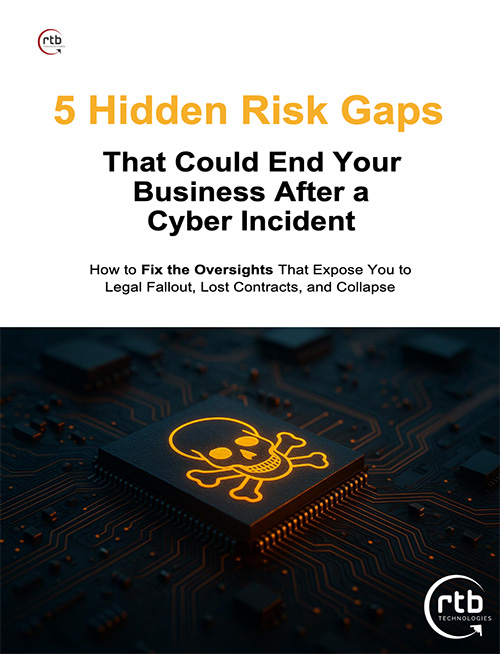
TITLE: Your Vacation Auto-Reply Might Be a Hacker’s Favorite Email
You set it. You forget it. And while you’re finalizing that pitch or packing for a long weekend, your inbox starts automatically broadcasting:
“Hi there! I’m out of the office until [date]. For urgent matters, please contact [coworker’s name and email].”
Sounds harmless—convenient, even.
Except… cybercriminals love to see exactly that.
That innocuous “out-of-office” message is a treasure trove of intel for anyone trying to hijack your organization’s data or launch a phishing campaign.
What Your Auto-Reply Is Really Telling Hackers
A typical OOO message often reveals:
- Your name and role (so they know who to impersonate).
- Exact dates you’re away (so they time their attacks when you’re least likely to notice).
- Alternate contacts (with their email addresses for perfect phishing templates).
- Internal team structure (helpful for crafting believable BEC messages).
- Even details about why you’re gone (“I’m at the annual title-industry conference in Denver…”).
That’s a blueprint for a flawless phishing or business-email compromise (BEC) attack.
How the Scam Usually Unfolds
- Auto-Reply Goes Live
Your email auto-responder announces you’re away. - A Hacker Takes Notes
They see who’s covering for you, who’s traveling, and when your inbox is on autopilot. - Impersonation in Action
Using the info from your message, they send a “time-sensitive” request for funds, contracts, or confidential documents. - Your Team Clicks “Send”
A trusted assistant or colleague, thinking it’s genuine, wires money or shares sensitive files. - You Return to Disaster
Suddenly you’re investigating a $50,000 fraudulent transfer or a leaked customer list.
If your company moves people between job sites, handles closings, or sends sales teams on the road, this becomes an even bigger liability.
Why Traveling Executives and Field Teams Are at Risk
In industries like title, legal, or finance—where staff are often out of the office or rely on assistants to manage urgent requests—a single well-crafted fake email can create chaos:
- Assistants juggle inboxes from multiple leaders and may rush payments or approvals.
- Teams trust internal names they see in the auto-reply, assuming any request using those names must be valid.
- Rapid, high-stakes workflows (loan closings, contract signings) make people eager to “get it done.”
One misplaced click or mis-dialed wire could cost hundreds of thousands in fines, reputation damage, or even legal liability if customer data is exposed.
How to Lock Down Auto-Reply Exploits
The answer isn’t “never use an out-of-office message”—it’s using them strategically and layering in safeguards. Here’s how to protect your company’s cyber liability while still keeping communication clear:
- Keep Your Auto-Reply Vague
• Skip detailed schedules or locations.
• Never name the individual who’s covering unless absolutely necessary.
• Example:
“I’m currently out of the office and will respond when I return. For urgent assistance, please contact our main office at [main phone/email].” - Train Your Team on Second-Channel Verification
• Make sure everyone knows: Never act on wire-transfer or sensitive information requests via email alone.
• Require a quick phone call or secure chat to confirm any “urgent” payment or data request. - Implement Advanced Email Security
• Deploy anti-spoofing measures, DMARC, DKIM, and SPF so fake emails get flagged before they land in your team’s inbox.
• Use filters to quarantine messages that mimic internal addresses. - Require MFA Across All Accounts
• Even if a hacker guesses or steals a password, they can’t log in without that second factor.
• This reduces the chance of credential theft turning into a full-blown breach. - Partner with a Proactive Cybersecurity Team
• A fractional CSO (Chief Security Officer) or managed security partner monitors login attempts, flags abnormal behavior, and alerts you before any damage occurs.
• Think of it as having a 24/7 watchtower—so you can actually relax on that beach without wondering if your inbox just got compromised.
Ready to Vacation Without Cyber Risk?
Don’t let your auto-responder become a hacker’s playbook. If you want to know exactly where your email and systems are vulnerable, let us show you a better way.
Click here to Book Your Cyber Risk Discovery Session!
We’ll perform a targeted review of your email configurations, endpoint security, and team training—then deliver a clear, high-value strategy that locks down your business without adding needless complexity.
Go ahead—enjoy that vacation with confidence. Let RTB Technologies keep your company’s cyber liability on lockdown.



